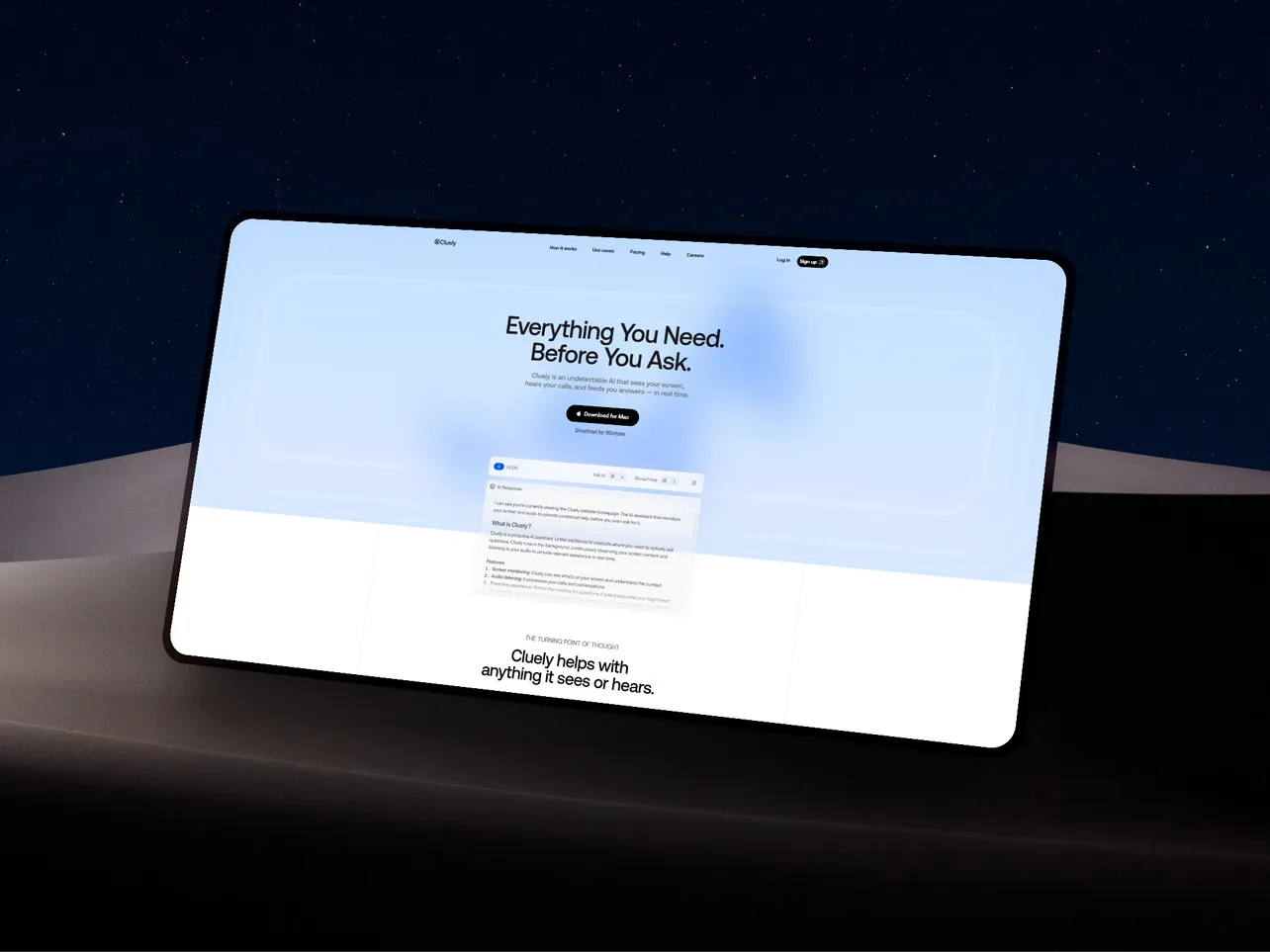Most founders worry about bad press. Roy Lee weaponized it.
The founder of Cluely is just 22, but his startup story is anything but typical. After getting kicked out of Harvard for breaking curfew, he spent a year in isolation teaching himself to code.
He went on to build a tool that helped people cheat technical interviews, used it to secure offers from Amazon and Meta, then turned them down. When he posted about the whole thing, Columbia expelled him too.
Somehow, all of that led to a $5.3 million seed round. Oh, and along the way, he cracked the code on viral marketing at Internet scale.
The Tool That Was Designed to Self-Destruct
Cluely started as an Interview Coder.
A brilliantly simple hack built in just one week. It was essentially a few lines of code that created a translucent overlay on your screen, invisible to screen sharing, that would feed you answers during technical interviews in real-time.
Roy didn't just build it; he used it himself to land offers from the biggest tech companies, recorded the whole process, and posted it online. The goal wasn't to run a sustainable business; it was to prove a point and capture attention.
The tool was "designed to die," as Roy puts it, because companies would inevitably adapt their interview processes.
But here's the genius: the controversy was the product. Every disciplinary hearing, every rescinded offer, every angry comment was rocket fuel for virality. When Columbia expelled him for posting internal documents online, Roy didn't retreat; no, he doubled down.
"Virality protected me from further punishment," he explains. Once you cross a certain threshold of attention, institutional backlash becomes neutered. The internet had his back.
From Controversy to Capital
That viral moment became the foundation for Cluely, which takes the core concept, an undetectable AI overlay, and expands it beyond interviews. The new pitch is provocatively simple: "cheat on everything."
Meetings, sales calls, presentations, you name it.
Cluely sits invisibly on your screen, listening to what's happening, and feeds you contextual information and suggestions in real-time. It's like having an AI coach whispering in your ear, except the whisper is visual and completely undetectable.
The ambiguity is intentional. "What does 'cheat on everything' even mean?" Roy asks. The phrase is engineered to provoke curiosity and start conversations, and sometimes that's exactly what a viral startup needs.
The Content Machine That Prints Views
But here's where things get really interesting. While Cluely is clearly an AI system, it's also a case study in modern viral marketing that would make MrBeast jealous.
Within their first week of launch, they hit 4 million views using brand-new social media accounts with zero prior traction. Their secret was a content factory that operates on what they call the "100 to 1" rule: make 100 different videos, and one will go viral.
Then repost that viral video across 100 accounts, and 20-30 of those will also go viral.
The operation is staggering in its scale:
- 50 interns creating 4 videos each per day (200 videos daily)
- Dedicated "idea guys" whose job is to generate 100 video concepts per batch
- Direct outreach to creators offering $20-40 per video plus $1,000 bonuses for million-view content
- A coaching system where every creator gets weekly performance reviews
- Strategic use of meme pages for 24-48 hour visibility spikes
They've essentially industrialized virality. And it's working. Their content machine generates millions of views daily across platforms.
Underneath all the marketing theater is genuinely innovative UX. Cluely's AI overlay is what Roy calls a "taste innovation". It's not just technically impressive, it feels like the future.
The system monitors your screen and audio in real-time, providing contextual assistance without you having to ask for it. No prompting, no switching tabs, no breaking flow. It's ambient intelligence that just works.
Their long-term moat isn't the tech alone but the personalized data they're building. Cluely learns your tone, your job, your writing style, and your use cases. Eventually, these ultra-personalized models will outperform generic tools like ChatGPT for user-specific tasks.
Playing the Internet Like a Game
Roy's approach to building Cluely reveals something deeper about modern startup strategy. He understands that the internet isn't real life, it's theater.
His online persona is deliberately polarizing, engineered for maximum attention. Offline, he's measured and private. Online, he's a spectacle.
"If half the audience doesn't hate it, it's not viral enough," he says about his content strategy. This isn't reckless. It's calculated.
He built his risk tolerance step by step, escalating from anonymous launches to filming himself cheating to leaking university documents. Each move invited more backlash and more attention, but with each escalation, the downside felt smaller while the upside remained asymmetric.
The Bigger Picture
Cluely represents something larger than just another AI tool.
It's a thesis about the future of human-computer interaction: that AI should work passively in the background, reading context, predicting needs, and acting without explicit input.
But it's also a masterclass in modern distribution. In a world ruled by algorithms, volume and velocity beat pedigree. Roy figured that out early and built a company designed to dominate the attention economy.
The real innovation isn't just the ghost AI overlay. It's the entire flywheel: original UX, proprietary user data, and an unmatched distribution engine.
When you're producing 200 videos a day and generating millions of views, virality becomes inevitable. And when attention compounds at that scale, product quality becomes secondary to distribution.
Roy Lee got expelled for building a tool to cheat interviews. Now he's raised $5.3 million to help everyone cheat everything. Sometimes the best revenge is building something impossible to ignore.
Cluely is available for download and is currently building toward an ambient AI future where prompting is obsolete and intelligence is invisible. Whether that's cheating or just clever depends on how you look at it.



